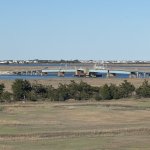STONE HARBOR – In an announcement June 16, New Jersey Audubon was awarded $1,280,000 from the U.S. Department of Interior’s National Fish and Wildlife Foundation Hurricane Sandy Coastal Resiliency Grant Program to work in partnership with Niles and Associates, the Wetlands Institute, Conserve Wildlife Foundation of New Jersey, the New Jersey Division of Fish and Wildlife, Stockton College and the Borough of Stone Harbor to restore and enhance beaches at Stone Harbor Point that will increase available quality habitat for migratory and beach nesting birds and coastal resiliency for the Borough and its residents.
Stone Harbor Point, an Atlantic coast barrier island in Cape May County, is situated at the southernmost end of Seven-Mile Island and designated as a “Protected Area” to be managed for threatened birds and their habitats. Stone Harbor Point provides a protective barrier to the Borough of Stone Harbor from damaging coastal storms and sea level rise. The Point is also favored by residents and visitors for recreational activities, including fishing, bird watching, photography, walking, and jogging.
Dr. David Mizrahi, Vice-president for Research and Monitoring, New Jersey Audubon explained, “In coastal regions, wildlife and people often must share the land. This project will demonstrate how efforts to improve habitat for wildlife populations also can provide benefits to human populations at the same time.”
Stone Harbor Point is a highly dynamic coastal site that experiences changes in length, width, and height on an annual basis and is one of a few unimproved inlets along the New Jersey and mid-Atlantic coastline. Early successional beaches provide critical habitat for many species of birds to nest, roost, and forage, including Red Knot, Piping Plover and American Oystercatcher.
In announcing the funding, U.S. Congressman Frank A. LoBiondo (NJ-02) stated, “It has long been known that South Jersey’s environmental treasures support critical fishing and oystering industries, provide vital habitats for wildlife such as the Red Knots, and serve as a natural buffer to protect residents and businesses from storm surges. Restoring and strengthening wetlands and marshes post-Sandy will help minimize future storm damage while promoting the economic livelihoods dependent on our region’s physical attractions.”
In a state with 127 miles of Atlantic coastline and 99% of its population living in coastal counties (US Census Bureau 2012), coastal resiliency strategies are critical to the welfare of the state and its people. This is particularly true in southern New Jersey, where the tourism-based economy is tightly linked to coastal systems and the threat of sea level rise ranks among the highest in the country.
Beach renourishment projects are an ongoing priority along the entire coast of New Jersey because of risks posed to communities by coastal storms and sea level rise. The U.S. Army Corp’s renourishment plans for Seven Mile Island communities, including Stone Harbor and Avalon, do not include Stone Harbor Point. However, sand from renourishment activities further north on Seven Mile Island provide a continual resupply of sand to the Point through southerly longshore drift. This ensures a long-term supply of sand for restoration. Sand harvesting will be used to build elevation and improve habitat quality for coastal birds and reduce coastal flooding for residents of the Point.
“This project is of critical importance to migratory shorebirds that stop in southern New Jersey during migration and will compliment Delaware Bayshore restoration efforts,” said Dr. Larry Niles of Niles and Associates, LLC.
Because materials are present locally, the source of sand is sustainable and the cost for sand acquisition and transport will be greatly reduced. Project monitoring will enable documentation of any biological impacts of sand harvesting on intertidal invertebrate communities to determine if this method is an ecologically sound approach for protected wildlife areas. This data will help to inform future restoration projects.
Eric Stiles, President and CEO of New Jersey Audubon concluded, “New Jersey Audubon is excited about the opportunity to work together with our partners on this critical project. We believe the outcomes will serve as a model for coastal restoration projects throughout the region.”
Burleigh – Middle Township is going in the wrong direction. Our taxes keep going up because of too much development. The mayor & committee need to stop acting like their job is keep builders, developers and…








